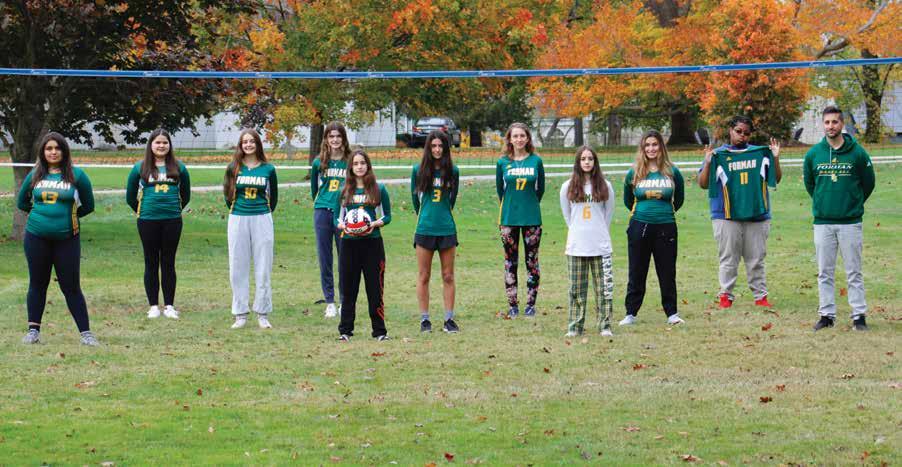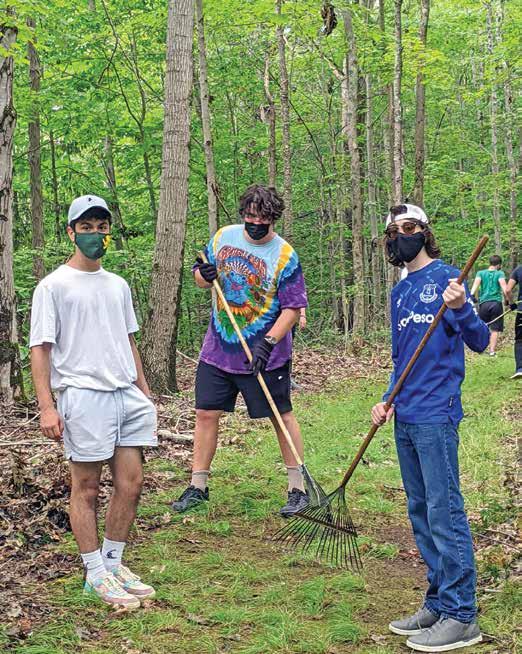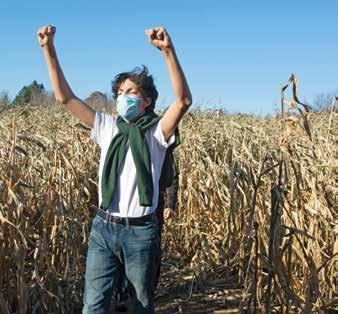
6 minute read
Alumna Profile: Noel Robbins Congdon ’46
Standing Against Racism
Forman’s recent commitment to stand against racism is rooted in current events and underscores the School’s core values of truth, respect, and kindness.
Several years ago, Forman School decided to formalize its core values and sought to promote and support the basic governing principles that underscore every good community. These values were not in scarce supply on campus, of course, but a renewed emphasis on them, and how we treat each other, was considered a valuable and worthwhile effort. There were meetings and break-out groups gathered to discuss the best way forward with this initiative. Those deliberations resulted in a message on the School’s website:
Inclusion Statement
Forman School was founded on the principle that there is great value in differences. With that in mind, we are committed to sustaining an inclusive community environment that fosters understanding and awareness of variances in race, gender, sexual orientation, age, ethnicity, religion, socioeconomic status, geographical origin, physical ability, and family structure. Forman fundamentally believes that we become better people when we learn from and embrace others who have different experiences and perspectives from our own. Our community welcomes those whose hearts and minds are open to differences and value truth, respect, and kindness.
The words “Truth, Respect, Kindness” are often posted in dorms and in hallways in academic buildings. They are strong reminders of how to behave, and apply to any situation where leaders wish to correct or comment upon social behaviors. These values are also in play when rules are broken and discipline is required. It is hard to think of a transgression that does not relate to these vital, human ideals.
In the spring of 2020, as the COVID-19 pandemic began to spread and gather a lot of attention, there were several news stories that captured the nation’s attention and shined a light on examples of how black people are still not treated equitably in this country, often by law enforcement officers. The deaths of George Floyd, Breonna Taylor, and Ahmaud Arbery in 2020 reminded everyone of the stories of Trayvon Martin, Eric Garner, and Philando Castile. The Black Lives Matter movement, which started in 2013, regained momentum and the summer saw protests all over the country, most of which were peaceful, but some led to vandalism and looting. Discussions of systemic racism and white privilege, and reactions to them, were taking place every day, on television, on radio, in podcasts, and in person.
And at Forman. Students, faculty, and staff agreed that something had to be done to ensure that the Forman community was sensitive to these issues and had things in place to combat any form of social injustice. Nothing could be taken for granted and everything was fair game for scrutiny, with an eye toward positive change.
“We formed a faculty anti-racism group over the summer that generated good discussions,” says Allie Maxwell, Director of Student Life. “Some of us read White Fragility and Stamped. We continued with our Diversity Club and formed an Alliance/Pride Club for students. We are forming a task force to evaluate the status of LGBTQ+ inclusion on campus. We are also making more of an effort to highlight Cultural Heritage Months at the suggestion of students.”
With Forman adjusting its class schedule into terms last fall, Intersessions were held after the first two terms, and the initial topic was race. Students and faculty engaged seriously in the subject with discussions about racism and anti-racism, intersectionality, and a viewing of an episode of “Little Fires Everywhere,” among other programming.
“The first Intersession was built around themes of race in our country,” says Maxwell. “But we also looked at culture and identity more broadly.”
Another byproduct of going to the term schedule was the need for more class choices, as there would be four distinct terms in a semester. The faculty had an opportunity to include more social justice themes and topics across the curriculum.
“We are also trying to figure out what an anti-racist school would look like,” says Maxwell. “We want to approach that goal in a way that is non-political because we see it as a non-political issue. Our charge is also to monitor this process and make sure we are evolving along with the world around us.”
“The conversation about social equality has to be ongoing,” says Mike Kowalchick, Associate Head of School. “It is important to note progress but also to not let a sense of progress lead to complacency. These wounds are deep and some offensive behaviors are quite unintentional. We can hurt each other without meaning to or even knowing it happened. Those moments also unfortunately reinforce the very system or structure we are trying to change.”
So, in the summer of 2020, Forman began to encourage a transparent, ongoing discussion of race and social equality on campus. The Anti-Racist Task Force was formed and is guided by this mission statement:
The ARTF seeks to be a practical and supportive guide for students, staff, and faculty that upholds Forman’s commitment to being an anti-racist, multicultural institution. This group is not a governing body and expects that everyone in this community will participate actively in this work to create real and meaningful change.
The idea has taken many forms on campus, from the task force to informal, unplanned conversations about how to make progress and sustain awareness of any systemic biases at Forman or in the simple, everyday ways that people interact. Kowalchick says that the goal, ultimately, is to find ways to organically become more aware as a community of unfair situations, and to speak out against instances of social injustice, privilege, or unfair treatment of any member.
“This process involves calling people out to call them in,” says Kowalchick. “It is important to attack the idea, not the person. We also hope people will call themselves out in an effort to acknowledge, and break down, a racist system. Walking down the street is not the same experience for everyone. It’s about acknowledging that fact and moving forward while staying aware of it.”
In looking to the future, Forman will continue to focus on the many issues that are within the idea of inclusion, such as race, gender, life experience, age, identity, and ethnic background. These topics will be part of daily campus life through activities, future Intersessions, athletics, and academics. Forman will seek outside input and, for example, will make sure to adhere to the National Association of Independent Schools Guidelines for Inclusion.
“Forman takes a progressive approach to education so this effort is right in step with how we teach,” says Math Teacher Arlis Astudillo. “We acknowledge and embrace differences at Forman and we build students up based on those differences, whatever they may be.”
Students made it clear in the Intersessions that they felt Forman would do well to have more of these conversations around social justice. Yet, some students are reluctant to engage for a variety of reasons.
“During the first Intersession, I saw several students who were initially reluctant to participate, despite caring about the subject deeply,” says Maxwell. “But they put their nerves aside and spoke and afterwards were very happy they did. They appreciated that they had the experience and opportunity. Those moments of growth are at the heart of this effort.”










